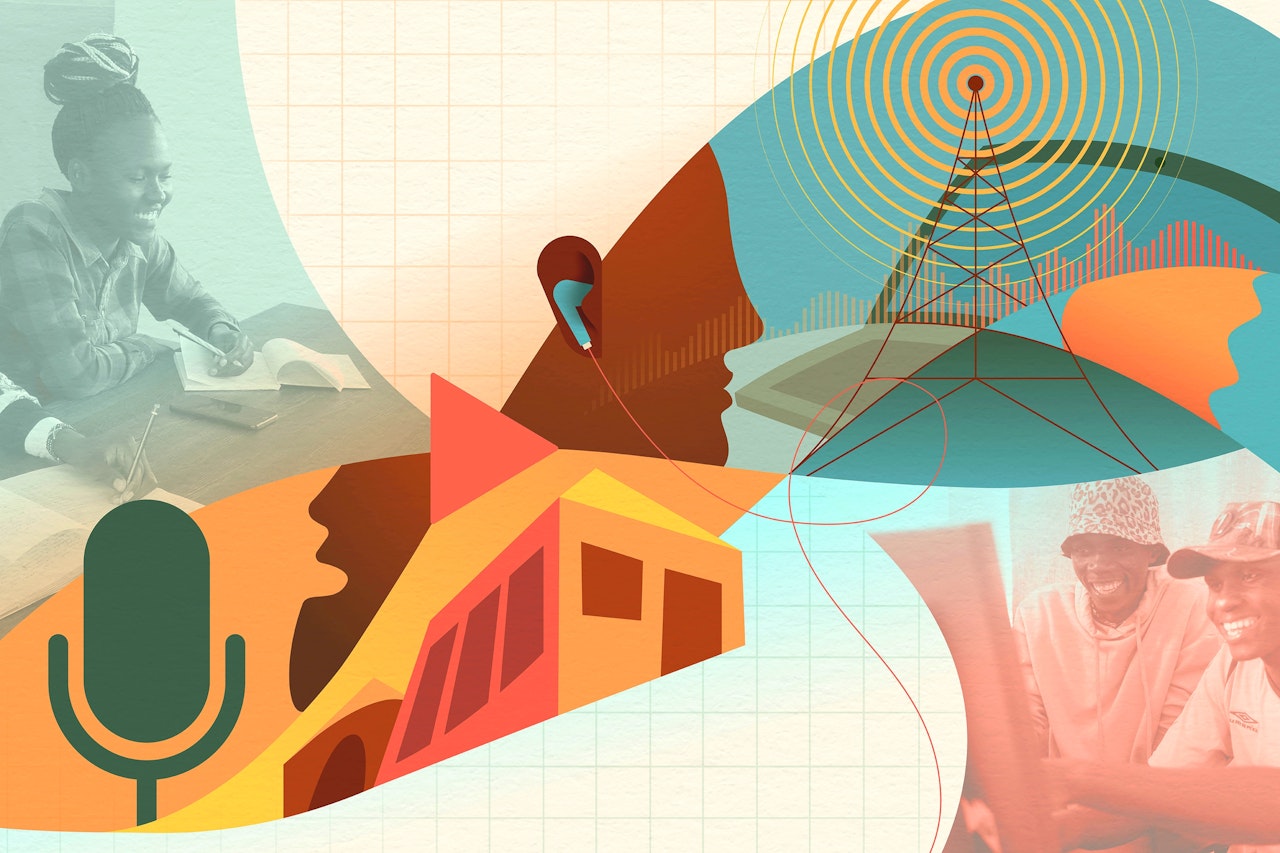Radio Jamii
Youth-led broadcast service fosters a sense of belonging in Lwanda
A group of youth in Kenya record and distribute programs on local issues through messaging platforms, stimulating vibrant discussions about social progress.

A group of youth in Kenya record and distribute programs on local issues through messaging platforms, stimulating vibrant discussions about social progress.

LWANDA, Kenya — In the vibrant village of Lwanda, Kenya, Radio Jamii has become a source of hope and collective progress.
This dynamic youth-led broadcast service emerged in 2021 on the grounds of the Bahá’í House of Worship in Matunda. It was initiated to record and share the program for the Centenary of the Ascension of ‘Abdu’l-Bahá through a social media messaging platform. Its modest beginnings have since blossomed into a promising means of reflecting the community’s high aspirations.
Today, Radio Jamii, meaning “community radio” in Swahili, weaves together insights and perspectives of people from diverse backgrounds, enriching conversations on themes of social progress. Supported by the community, local institutions, and the village chief, the broadcast service has become a valuable contributor to community life.
Fostering a sense of belonging
Boniface Mung’asia Mugajibera, one of Radio Jamii’s founders, emphasizes the service’s inclusive purpose: “The aim of Radio Jamii is to ensure that insights about community building reach a growing number of people, regardless of their religious beliefs, ethnicity, or culture.”
Dennis Makalaya, a member of the team, speaks about the initiative’s role in strengthening community bonds by promoting shared narratives. “We are learning how to create a sense of belonging by giving people the opportunity to discuss their ideas about how to contribute to transformation in our community,” he says.
This approach has cultivated a sense of ownership within the village, particularly through the efforts of the broadcast team to learn about incorporating cultural and traditional aspects of the community into programs. Mr. Mugajibera says, “This is done through storytelling, interviews, and news that is aired in local languages with local music. Presenters are learning about this by studying different cultural literature and exploring traditional music from local artists.”
The programs of Radio Jamii also address a wide range of pertinent community issues, from agriculture and environmental conservation to health, featuring practitioners from these fields as well as drawing on insights from religion. Daily news programs focus on local events, particularly those contributing to social cohesion and collective wellbeing.
Albert Lihanda who oversees the functioning of Radio Jamii explains that although the focus of reporting is on activities in Lwanda, the initiative’s vision of inclusivity means that the team makes efforts to connect other communities to the expanding conversation. “We also visit more remote villages to capture audio recordings of their stories and perspectives, ensuring that the voices from the outskirts are also heard and valued in our broader conversation,” he says.
Growing in complexity
Radio Jamii has seen its operations expanding over the past two years, with the number of participants in the initiative growing from a few dedicated youths to a group of 18 young people. Together, they are shouldering responsibility for an array of production roles, encompassing research, writing, presenting, recording, editing, and distribution.
These youth are not only gaining technical skills but are immersing themselves in an environment rich with spiritual insights and knowledge from diverse academic subjects, which they then weave into their broadcasts.
This experience, together with the dynamic environment at the small recording studio, is inspiring some of these youth to pursue further education in the field of media.
Inspiring support of local leaders
Local leaders in the village of Lwanda are recognizing the impact that Radio Jamii is having and express their support for it. Mourice Mukopi, the Chief of Lwanda, often invites the broadcast team to meetings with the village elders, and other public officials, to share music and other content highlighting promising community activities, including those emerging from Bahá’í efforts focused on moral and spiritual education.
Chief Mukopi has ensured that the village elders’ social media messaging group regularly receive content from Radio Jamii as a means of keeping them informed of community activities.
He also expressed joy at seeing the youth of the village develop new capacities and create opportunities for service as journalists and reporters—activities that had never been part of village life.
“I have observed transformation since Jamii radio engaged our youth,” said Mr. Mukopi, “I have seen youth leave behind crime and participate in activities aimed at the betterment of our community.”